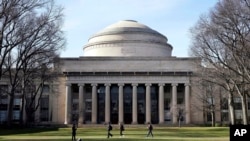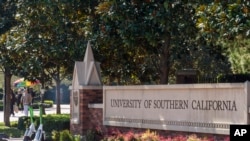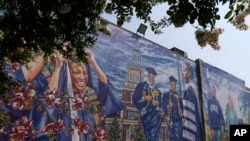Student Union
Confused About American Politics? Enjoy Our Political Dictionary!
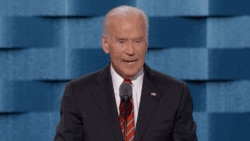
Here is a collection of political terms we hope will help you better understand the 2016 election. If there are any you don’t see here, please reach out to us in the comments or on our Facebook and we'll add them!
A
Aide: A person who works closely with a candidate to keep them on schedule and help them with various tasks.
Attack Ad: Ads that portray a candidate in negative terms and are used to convince voters that the candidate would be bad for America.
B
Battleground/Swing states: Battleground states are those where there is not a clear majority of voters for one candidate or the other. These are the states where both parties feel they could win, hence, the term "battleground." There are 11 swing states in the 2016 election, says Politico: Colorado, Florida, Iowa, Michigan, Nevada, New Hampshire, North Carolina, Ohio, Pennsylvania, Virginia and Wisconsin. You will hear or see the candidates making many trips there.
Benghazi Attack: Benghazi is a foreign policy mishap that continues to follow Hillary Clinton. According to Yahoo, Benghazi refers to "The September 11, 2012, attack on United States diplomatic facilities in Benghazi, Libya, that left four Americans killed." Clinton was Secretary of State at the time of the attacks, and many on the Right blame her for the deaths that occurred.
Blue States: A blue state votes consistently Democratic in elections.
C
Campaign Trail: Describes the trips a candidate takes to meet voters where they live. That can be in big American cities, or in small, rural towns. When Hillary Clinton tours a steel factory in Ohio, she’s on the campaign trail. When Donald Trump speaks in Arizona about immigration, he's also on the campaign trail.
Capitol Hill: The hill in Washington, D.C. where the white-domed U.S. Capitol building is located. It is home to the U.S. legislature where lawmakers work when they are in Washington.
Clinton Foundation: The Clinton Foundation is an international charitable organization run by former President Bill Clinton and the Clinton family.
Constituents: Constituents are voters and/or residents in a district or state, to whom office holders are expected to be responsible. Office holders usually see caring for constituents’ needs as their most important duty, and as being critical to re-election.
D
Dark Horse: "A candidate who seems to have little support but then emerges unexpectedly to prominence." (VOA News)
Dead heat: When candidates seem to have exactly the same quantity or proportion of votes or delegates, as in poll numbers. Dead heats are too close to call, and it is unclear which candidate has a better chance of winning. If the race was split 50/50, that would be a dead heat.
Delegates: Citizens who participate in the state political and electoral process to select the candidate for the national party nomination.
Democratic Party: The Democratic Party is one of the two major political parties in America. Democrats are usually focused on social issues, such as health care, education and minority rights.
E
Election Day: Presidential Election Day in the U.S. is the Tuesday after the first Monday of November. Got that? This year it is Tuesday, November 8. There are other election days, but they are for lower seats and races.
Electoral College: The Electoral College decides the American presidential elections. Each state has representation in the Electoral College equal to the number of seats the state has in the U..S House of Representatives. (This is decided by census data.) In most states, the party that wins the most delegates in a state wins the entire state's votes in the Electoral College. That is also known as "winner take all."
Electoral Mandate: An electoral mandate occurs when a candidate wins an election in a landslide. A landslide election means both the president and a majority of Congress are from the same party, and are therefore seen to have a legislative advantage in the coming year.
Email Scandal: The scandal alleged when Hillary Clinton used a private email server during her time as Secretary of State. While the FBI found that Clinton did not violate any laws by using a private server, they did find that she and her team were "extremely careless" in their handling of the classified information.
Endorsements: Endorsements are given to candidates by other politicians, prominent figures, or powerful organizations or institutions, to serve as guidance to voters. For instance, New Jersey Governor Chris Christie endorsed Donald Trump, in the hope that Republican voters will be guided by that endorsement, or preference. President Obama has endorsed Hillary Clinton.
F
First 100 days: The first 100 days of a presidency is a phrase used by candidates on the campaign trail to idealize about what they would like to do when they get into office.
General election campaign: The period of time when the top candidates from each party compete to be elected. This takes place from after the conventions -- which generally take place in July-August -- to Election Day on November 8.
Glass ceiling: An unfair system or attitude that prevents women from getting top jobs, per Merriam-Webster. When Hillary Clinton won the Democratic nomination, it was said she broke the "highest and hardest" glass ceiling.
Grassroots: Grassroots campaigns are campaigns started by the voters. Whether it is fundraising or registering more voters, their main purpose is to start the political conversation. (VOA News)
Green Party: The Green Party’s main issue is the environment, and it is one of America’s so-called third parties. This year their presidential candidate is Jill Stein.
H
House: The House of Representatives is half of the Legislative branch of American government, where laws are made. The other chamber is the Senate. Each state has a number of representatives based on population. A state with fewer people like Nevada, with nearly 3 million, has far fewer representatives than New York, with more than 8 million. Representatives are elected for two year terms.
I
Incumbent: The candidate in office. In 2012, President Obama was the incumbent in the presidential race because he won in 2008. Incumbents are historically hard to win against.
Independent: An independent is a voter or candidate who claims to have no official orientation towards a certain party.
L
Lame duck: A lame duck is what the president is called after his successor is elected. After November 8, 2016, President Obama will be considered a lame duck president.
Left Wing : According to Merriam-Webster, the left wing is "the part of a political group that consists of people who support liberal or socialist ideas and policies."
Lesser of Two Evils: "In every presidential election, there are always people who don't like either of the two major party candidates running for president. This year is no different. Some say they don’t trust Hillary Clinton, the Democratic party candidate. Others feel Donald Trump, the Republican candidate, does not have the temperament to be president. So these voters feel they have to choose the lesser of the two evils when they cast their ballots in November. " (VOA News)
Libertarian Party: According to the Libertarian Party, its party members, "Seek a world of liberty; a world in which all individuals are sovereign over their own lives and no one is forced to sacrifice his or her values for the benefit of others." The Libertarian Party’s presidential candidate in 2016 is former New Mexico Governor Gary Johnson.
M
Majority: The party that has the most seats in Congress is considered the majority party. The Republican Party holds a majority in the House and the Senate.
Minority: The party that has fewer seats in Congress. The Democratic Party is the minority party in both houses of Congress.
O
On the stump: When a candidate is on the "stump," they are in front of an audience, giving a speech and stating why they should be elected. This speech is often called a stump speech.
P
Policy position: A position a candidate takes on an issue. On immigration, Trump has said there should be a wall built between Mexico and the United states. This would be one of his policy positions: being tough on immigration. One of Clinton's policy positions would be to enact more gun legislation in America, like background checks for people who want to buy firearms.
Politically Correct: "Agreeing with the idea that people should be careful to not use language or behave in a way that could offend a particular group of people." (Merriam-Webster)
Political Junkie: "A light-hearted way to label a person who just can’t get enough of every latest poll, political ad." (VOA News)
Political outsider: Someone who is not part of established Washington politics, and has entered politics without prior political experience. Donald Trump is considered a political outsider. Clinton is considered an insider.
Polls: Polls are metrics that are used to gauge public support for a person or a policy.
Popular vote: The popular vote is the total number of votes cast in an election.
President-elect: Candidates are called the president-elect between the time they win the general election (November 8) to the time they are inaugurated (January 20). When Senator Barack Obama beat Senator John McCain in 2008, he was president-elect for several months while President Bush finished his term in office.
Primaries: State contests that take place during the first half of an election year, where politicians compete to become their party’s nominee. Donald Trump and Hillary Clinton won a majority of the primaries in their respective races, so now they are able to compete in the general election.
Pundit: A commentator who offers his or her political insights and opinions on the campaigns. (VOA News)
R
Red states: Red states are those that consistently vote Republican.
Republican: The Republican Party is one of the two major parties in American politics. Republicans are usually considered more conservative.
Right Wing: Merriam-Webster states that right wing means "the part of a political group that ... supports conservative or traditional ideas and policies" compared to everyone else in their party. Both Democrats and Republicans could be to the right within their own party.
RINO: “Republican in Name Only,” is a term used to describe someone who calls her or himself a Republican but does not support policies generally associated with the Republican Party.
Running mate: The running mate is the vice presidential candidate on any ticket. Tim Kaine of Virginia is Hillary Clinton’s running mate, and Mike Pence of Indiana is Donald Trump’s.
S
Sanctuary Cities: "A sanctuary city is a city in the United States that adopts local policies designed to not prosecute people solely for being an illegal alien." (Wikipedia)
Secretary of State: According to the U.S. Department of State, the Secretary of State is “the President's chief foreign affairs adviser.” He or she is appointed by the president with the advice and consent of the Senate.
Senate: The Senate is a part of the Legislative branch of American government, where the laws are made. Each state has two Senators, who serve six year terms. Hillary Clinton was one of two of New York’s senators before she ran for president in 2008.
Speaker of the House: The Speaker of the House is the leader of the House of Representatives. The speaker of the House is Republican Paul Ryan of Wisconsin, since Republicans hold a majority of seats the House.
Super PAC: A PAC is a "Political Action Committee.” These are groups formed by citizens to raise money in support of candidates or a cause. A Super PAC goes beyond the abilities of a normal PAC, which has contribution limits. According to opensecrets.org, “Super PACs may raise unlimited sums of money from corporations, unions, associations and individuals.”
Supreme Court: The Supreme Court is the highest court within the Judicial Branch of American government.
Surrogate: A surrogate is someone who represents a candidate and the candidates policies, often standing in for the candidate at forums, rallies and interviews.
T
Tax returns: Tax returns are the forms American taxpayers file each year to declare to the government how much they have earned and how much tax they are paying. Everyone who earns income in the United States must file tax returns. Modern-day presidential candidates make public their tax returns during the campaign, but Republican Donald Trump has so far refused to release his returns.
Tea Party: The Tea Party is an ultra-conservative movement within the Republican Party. Their website says that "the Tea Party is a grassroots movement that calls awareness to any issue which challenges the security, sovereignty, or domestic tranquility of . . . the United States." Their name is a reference to the 1773 Boston Tea Party, when the Sons of Liberty threw tea into the Boston Harbor to protest taxation, among other things.
Unfavorable Rating: The unfavorable rating of a candidate is a measure of how much the American electorate dislikes him or her. Donald Trump and Hillary Clinton have the highest unfavorable ratings in American presidential contest history.
V
Vetting: Vetting is the process possible candidates goes through before they are selected, because if a candidate isn’t vetted properly, an unforeseen scandal may pop up. For instance, Tim Kaine was vetted in 2008 by then-Senator Barack Obama, and, therefore, was a safe choice for Hillary Clinton's vice presidential pick.
Vice President: The vice presidency is a loosely defined office. The incumbent presides over the U.S. Senate and is first in line to succeed the president if she or he should become incapacitated. The vice-president may be given other duties as the president sees fit.
W
The Wall: One of Donald Trump’s biggest issues, which concerns building a border wall between Mexico and the United States. At Trump rallies one of the most popular chants is “Build the Wall!”
X
Y
Z
Please leave a comment and visit us on our Facebook page, thanks!
See all News Updates of the Day
Malaysian official: Schools can’t turn away from global tensions
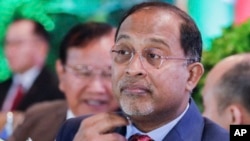
Zambry Abdul Kadir, Malaysia’s higher education minister, said protests spreading across universities in the United States show that schools can’t ignore political tensions.
Helen Packer, reporting in Times Higher Education, said the minister reminded educators that universities are key in the development of leaders, individuals and societies. (April 2024)
Social media breaks are difficult, but necessary

Between online classes, maintaining social connections and working on projects, college students can have a hard time disengaging from the demands of technology.
In Florida International University’s PantherNOW, Ariana Rodriguez offers strategies for taking a break from social media. (April 2024)
- By Melos Ambaye
Many master's degrees aren't worth the investment, research shows

Nearly half of master's degrees have a negative financial return, according to new research by the Foundation for Research on Equal Opportunity, an economic research organization.
The study indicates that many graduate degree programs do not increase lifetime earnings enough to be worth it.
While 23% of bachelor’s degree programs yield a negative financial return on investment, 43% of two-year degrees and master’s degrees fail to deliver a return, according to the study by Preston Cooper, a senior fellow at FREOPP.
Cooper assessed the return on investment for 53,000 degree and certificate programs to determine whether a student’s lifetime earnings outweigh program costs and the risk of not completing their degree.
His findings show that a student’s field of study was the overriding indicator of return on investment at the undergraduate and graduate level.
Engineering, computer science and nursing bachelor’s degrees have high financial returns on investment, while programs in education, fine arts, psychology and English usually have low returns.
Graduate degrees in medicine and law tend to have strong payoffs. But a large share of master’s programs, including the MBA, frequently have low payoffs, according to Cooper.
Although workers with master’s degrees earn 16% more than those with only bachelor’s degrees, Cooper says the figure fails to account for students who had “higher preexisting earnings potential.”
“MBA students typically have high preexisting earnings potential, having often chosen high-ROI undergraduate majors such as finance and economics,” Cooper writes. “So the MBA adds little value on top of that.”
The study indicates that high starting salaries are predictors of high returns on investment. Degrees with starting salaries of $57,000 a year or more deliver the best lifetime returns.
But the return on investment of a degree can vary depending on the educational institution.
“Students interested in fields with low average pay can still find some schools that do well transforming those fields of study into high-paying careers,” Cooper writes.
The quality of an institution also matters, said William Tierney, professor emeritus of higher education at the University of Southern California.
“An MBA from Harvard is a likely ticket to a good job,” Tierney told VOA. “An MBA from the University of Phoenix, less so.”
But students pursue graduate programs for more than just financial reasons.
“Some degrees open up careers in fields that students may enjoy, such as in the performing arts,” Robert Kelchen, head of educational leadership at the University of Tennessee, Knoxville, told VOA.
“Others can help gain access to social networks or simply help students learn about a topic that is of interest,” Kelchen added.
Cooper told VOA that it might make sense for students in degree programs with low returns on investment to switch majors if they can still graduate on time.
He found the worst outcome for a student’s return on investment is dropping out of college “because they must pay for one or more years’ tuition and spend time out of the labor force.”
Lawmakers who fund higher education have a responsibility in ensuring “higher education delivers on its promise of economic mobility,” Cooper said.
Nearly a third of federal funding, including Pell grants and student loans, pays for higher education programs that fail to provide students with a return on investment, according to the study.
Cooper’s view is that “some schools should shut down low-ROI programs and reallocate institutional resources to programs with a better return.”
“There's definitely this narrative out there that higher education is always worth it, and you should always try to get that extra degree because it will increase your earnings,” he told VOA. “That's reinforced by colleges who make lofty promises regarding their graduate degree programs' outcomes, which all too often fall short.”
Harvard students end protest as school agrees to discuss Gaza conflict
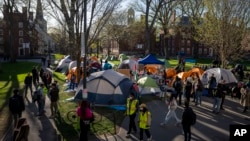
Protesters against the war between Israel and Hamas were voluntarily taking down their tents in Harvard Yard on Tuesday after university officials agreed to discuss their questions about the endowment, bringing a peaceful end to the kinds of demonstrations that were broken up by police on other campuses.
The student protest group Harvard Out of Occupied Palestine said in a statement that the encampment "outlasted its utility with respect to our demands." Meanwhile, Harvard University interim President Alan Garber agreed to pursue a meeting between protesters and university officials regarding the students' questions.
Students at many college campuses this spring set up similar encampments, calling for their schools to cut ties with Israel and businesses that support it.
The Israel-Hamas war began when Hamas and other militants stormed into southern Israel on October 7, killing some 1,200 people and taking 250 hostages. Palestinian militants still hold about 100 captives, and Israel's military has killed more than 35,000 people in Gaza, according to Gaza's Health Ministry, which doesn't distinguish between civilians and combatants.
Harvard said its president and the dean of the Faculty of Arts and Sciences, Hopi Hoekstra, will meet with the protesters to discuss the conflict in the Middle East.
The protesters said they worked out an agreement to meet with university officials, including the Harvard Management Company, which oversees the world's largest academic endowment, valued at about $50 billion.
The protesters' statement said the students will set an agenda that includes discussions on disclosure, divestment, reinvestment and the creation of a Center for Palestine Studies. The students also said that Harvard has offered to retract suspensions of more than 20 students and student workers and back down on disciplinary measures faced by 60 more.
"Since its establishment three weeks ago, the encampment has both broadened and deepened Palestine solidarity organizing on campus," a spokesperson for the protesters said. "It has moved the needle on disclosure and divestment at Harvard."
Chinese students report interrogations, deportations at US airports

Academics from China are reporting increased scrutiny at U.S. airports, with valid visa holders being interrogated and turned away by Customs and Border Protection Agents.
Phones and laptops have been searched, and researchers have undergone extensive questioning about their work. One graduate student at Yale, who was midway through her PhD, was turned back at Dulles airport and banned from entering the U.S. for five years, according to The Guardian.




